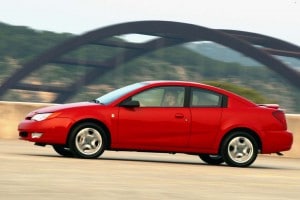
Under mounting pressure, General Motors has significantly expanded a recall involving defective ignition switches — now linked to 31 crashes and at least 13 fatalities – affecting a total of nearly 1.4 million vehicles in the U.S. alone.
The maker also issued an apology for the problem which critics say it has long known about and failed to respond to in a timely manner.

“Ensuring our customers’ safety is our first order of business,” said GM North America President Alan Batey. “We are deeply sorry and we are working to address this issue as quickly as we can.”
The maker first announced plans to recall nearly 800,000 older compact models about two weeks ago. At the time, GM officials said it knew of 22 separate accidents and six fatalities connected to the problem.
The issue involves a defective ignition switch that inadvertently can be turned either to the “off” or accessory positions, turning off the engine and most electrical components. That includes vehicle airbag systems that would be needed in a crash – especially one that might result from a vehicle losing control when inadvertently turned off.
The first announcement covered just three models: the Chevrolet Cobalt and Pontiac G5 sedans sold in North America during model-years 2005 through 2007, as well as the Pontiac Pursuit sold in Canada. After the original recall was announced, however, GM came under fire from safety advocates who contended it had excluded a number of vehicles using the same, defective ignition switch.
Added to the list of recalled vehicles are 2003-2007 Saturn Ions, 2006-2007 Chevrolet HHRs, and 2006-2007 Pontiac Solstice and Saturn Sky models. All told, 1,367,146 vehicles are now covered, or roughly when 1.6 million when Canada and Mexico are included.
The expanded recall may not completely satisfy all critics. GM has also come under fire from some quarters where it has been accused of waiting longer than necessary to address the problem. Federal regulations have specific guidelines covering how and when a manufacturer must act on a known safety defect. Makers including Ford, BMW and Toyota have faced hefty penalties in recent years and GM could, as well, if the National Highway Traffic Safety Administration were to determine it delayed the recall unnecessarily.
The maker said it has submitted documentation to NHTSA – including a chronology of its actions on the switch problem.
Said North American chief Batey, “The chronology shows that the process employed to examine this phenomenon was not as robust as it should have been,” said Batey. “Today’s GM is committed to doing business differently and better. We will take an unflinching look at what happened and apply lessons learned here to improve going forward.”
A fine from NHTSA could be the least of GM’s worries, however. The maker has already had to deal with several cases related to the problem in the form of legal actions filed by consumers. But there’s also the court of public opinion.
This “could be a hit to their image. It could accept consumers’ perception,” cautioned Stephanie Brinley, a senior analyst at IHS Automotive. At the same time, she added, “I’m impressed with their coming out and apologizing. They’re handling it differently from before.”







